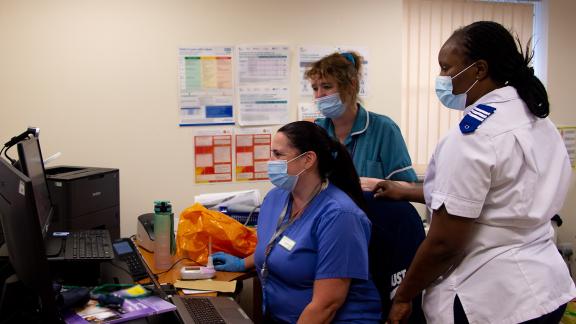Improving workforce wellbeing through a staff-led approach

The 2021 NHS Staff Survey showed that while staff at Hertfordshire Partnership University NHS Foundation Trust (HPFT) were passionate about delivering the best care for patients, they reported high levels of burnout and exhaustion and there were significant absences related to mental health.
To help staff better prioritise self-care, the trust has worked to improve its health and wellbeing package, engaging with staff to update and co-produce its offer. This staff-led approach brought improvements in results across a number of measures for workforce wellbeing.
Key benefits and outcomes
- An increase of 2.3 per cent in staff saying the trust takes positive action to support health and wellbeing.
- 81.5 per cent of staff said they felt a sense of being looked after by HPFT.
- Staff reporting musculoskeletal issues reduced by 3.2 per cent and the trust is no longer an outlier compared to the national average.
- HPFT was ranked in the top five mental health and learning disability trusts to work for in England, measured by staff recommending it as a place to work.
What the organisation faced
Results from the 2021 NHS Staff Survey showed staff at HPFT are highly committed and motivated, and passionate about caring for their patients. However, it also highlighted that staff were often working unpaid hours, coming into work unwell, and scores relating to experiencing musculoskeletal issues were significantly higher than average.
The trust wanted to ensure staff preserved the level of passion and compassion shown to patients, while improving and prioritising their own wellbeing.
What the organisation did
The trust developed a project to create new a wellbeing strategy. This involved staff from the outset through engagement events and staff networks. As a result, HPFT focused its wellbeing strategy and delivery plan on self-care.
One initiative saw the introduction of externally commissioned health MOTs across key sites. Over 10 per cent of staff took up the offer, filling all the slots available at the time. Feedback was very positive, with 93 per cent finding the sessions valuable, 62 per cent saying it had motivated them to make lifestyle changes and 23 per cent saying they had discovered a health issue they had been unaware of.
The trust also held a self-care and wellbeing festival promoting the range of staff support services available, while offering a range of physical and stress therapies to staff on the day. The event also provided more than 1,600 portions of food and almost 1,000 self-care sessions. Feedback was incredibly positive and helped shape a similar winter festival.
Throughout the year, the trust used engagement events, newsletters and its network of wellbeing champions to check in with staff and ensure its offer remained relevant and supportive. The project team also monitored workforce metrics, encouraged staff feedback and evaluated each intervention introduced.
Managers received increased support through training programmes which helped improve confidence in dealing with wellbeing topics including menopause and mental health.
The appraisal system was updated to ensure it included conversations about wellbeing, as well as personal aspirations and support requirements. Staff induction was also updated to include the importance of self-care and promote the health and wellbeing offer.
Senior-level buy-in was established from the outset. The project proposal was taken to the trust's people and OD group, which was regularly updated on progress using the staff feedback gathered and evaluations of the interventions offered.
Results and benefits
HPFT saw a range of benefits following the introduction of its health and wellbeing strategy including a reduction in mental health and musculoskeletal-related sickness absence rates compared to those recorded in 2021/22. This was further evidenced in the trust’s 2022 NHS Staff Survey which showed:
- A 2.3 per cent increase in staff saying the trust takes positive action to support health and wellbeing.
- Staff reporting musculoskeletal issues reduced by 3.2 per cent and is no longer an outlier compared to the national average.
- 2.5 per cent fewer staff reported working additional unpaid hours.
- 1.5 per cent fewer staff reported feeling unwell as a result of work-related stress.
The Health Service Journal’s analysis of the 2022 NHS Staff Survey ranked HPFT in the top five mental health trusts to work for in England – resulting from the percentage of staff recommending the organisation as a place to work.
Project evaluations also found 70 per cent of staff felt a positive impact from the wellbeing initiatives, while 81.5 per cent said they felt looked after by HPFT and 82 per cent agreed that the wellbeing offer was a perk of working for HPFT.
The project team reports that the example set by staff, managers and senior leaders prioritising their own wellbeing has created a ripple effect, normalising this within the organisation, helping to improve attraction and retention of the workforce and the level of patient care.
Overcoming obstacles
The main obstacles were around resources. The project was run by a small team with limited funding, so the team had to find creative ways of organising and delivering everything they set out to.
Communication was also challenging due to the size of the organisation. It was difficult to cascade messages across a large number of busy staff and was ultimately achieved thanks to the network of health and wellbeing champions who helped spread the information through their channels, as well as the creative use of notice boards.
Top tips
Talking to and co-producing the new wellbeing offer with staff from the outset was key to the success of the initiative. By using this approach, HPFT achieved great engagement and involvement, reaching large numbers of staff across the organisation.
It was also important to continue to listen to staff and remain flexible, continuously adapting activities based on feedback received. This ensured the level of engagement remained high throughout while the uptake on the offer continued to be consistently high and well received.
Contact
You can learn more about the work in this case study by contacting Louise Thomas, deputy director of people and OD at Hertfordshire Partnership University NHS Foundation Trust, at louise.thomas11@nhs.net.



